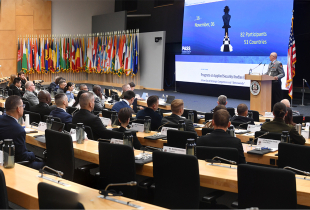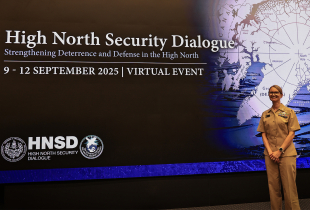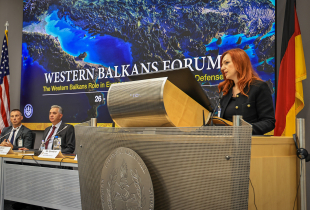
Parliamentarians form Turkey examine Role of Parliament in National Security at George C. Marshall Center
By Christine June
Public Affairs Office
George C. Marshall European Center for Security Studies
GARMISCH-PARTENKIRCHEN, Germany (April 28, 2016) – The George C. Marshall European Center for Security Studies hosted 10 parliamentarians from Turkey’s four main political parties during a two-day seminar April 26 and 27, designed to introduce them to different practices on the role of parliament in national security policy.
The Marshall Center plans nearly 100 events each year in addition to eight resident courses. This seminar was the first event designed specifically for Turkish parliamentarians.
The Marshall Center hosted parliamentarian seminars for Ukraine and Montenegro earlier this year.
“Our focus, national security policy, is the center of what governments do,” said Associate Director for International Liaison, U.S. Ambassador Douglas Griffiths to the leaders in welcoming them to the center. “Turkey has a long relationship with the Marshall Center. In fact just last week, Turkey has a participant graduate from our ‘Countering Transnational Organized Crime’ program. In total, there are 211 Turkish Alumni from Marshall Center resident programs that are part of a dynamic network of over 11,000 alumni around the world.”
“The Turkish parliamentarians’ participation in this program is very important. Day-to-day demands in Ankara would normally make this type of intensive discussion difficult,” U.S. Embassy Political Officer Natalie Oldani remarked.
During the seminar, which was designed by the Marshall Center’s Black Sea Region Program Office, the faculty provided an overview of European Regional Challenges. Parliamentarians also had the opportunity to speak to the Vice President of the European Parliament Dr. Ioan Pascu who shared his perspectives on the role parliamentarians play on addressing security issues.
According to Program Director Dr. Valbona Zeneli, the Turkish parliamentarians actively engaged in a very constructive and healthy dialogue on issues of national and international security. More importantly, despite the differences of cultures, nationalities, and political parties, the Turkish parliamentarians are not unlike those from their European neighbors.
“We are seeing most of the challenges of parliamentarians are very similar whether they are from countries in the European Union, NATO, or wherever. They are the voice of the people. They need to find the right tools to hold their executive branch and defense branch accountable. They need to learn how to establish trust and keep the dialogue open. Without trust and dialogue, it’s a very difficult problem,” Zeneli said.


